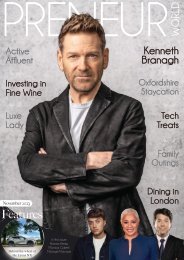Preneur World March 2023
The luxury lifestyle magazine for those with the Preneur MIndset. In this issue: Shania Twain, Florence Pugh, Helen Glover MBE, Active Affluent for full-on outdoor enthusiasts, Luxury Hotels in Dubai and further afield, Minipreneur Fashion, Toys & Books, Techtastic Treats, Fabulous Fizz, Ask The Expert and much more.
The luxury lifestyle magazine for those with the Preneur MIndset. In this issue: Shania Twain, Florence Pugh, Helen Glover MBE, Active Affluent for full-on outdoor enthusiasts, Luxury Hotels in Dubai and further afield, Minipreneur Fashion, Toys & Books, Techtastic Treats, Fabulous Fizz, Ask The Expert and much more.
You also want an ePaper? Increase the reach of your titles
YUMPU automatically turns print PDFs into web optimized ePapers that Google loves.
Unshakeable Confidence<br />
Diana Robertson is a member of Toastmasters International<br />
which provides communication & leadership skills<br />
Based on lessons from<br />
my personal experience,<br />
let me share four<br />
actionable ways to<br />
build your Unshakeable<br />
Confidence.<br />
1. IDENTIFY AREAS<br />
IN WHICH YOU ARE<br />
ALREADY CONFIDENT<br />
Ask yourself the question:<br />
“What am I already good at?” Awareness of what<br />
you have already been successfully doing in your<br />
life is the first and most important step you can take<br />
towards building your confidence. Answers may<br />
range from being a talented musician to being a<br />
good parent or friend. Scribble down any ideas that<br />
come to mind because everything you are good at is<br />
valuable.<br />
What this will highlight is that confidence is not<br />
absolute – because no individual on this planet is<br />
fully confident about everything in their life. All<br />
of us feel confident about particular aspects we<br />
know we are good at. And each of us struggles with<br />
specific areas that need improvement. Yet, when we<br />
face our pain points, rather than offering constructive<br />
solutions, our minds may find that there is something<br />
wrong with our entire being.<br />
Keep track of what you’re good at and avoid<br />
identifying your overall confidence with the areas<br />
you feel the least certain about. Remember that noone<br />
is good at everything, whilst developing new<br />
skills and gaining new knowledge is entirely under<br />
your control.<br />
2. CHANGE NEGATIVE THOUGHTS USING<br />
POSITIVE STATEMENTS<br />
Changing your thoughts is easier said than done.<br />
However, our thought patterns are no different to the<br />
muscles in our bodies. Both can be trained.<br />
A great way to begin reprogramming your mind is<br />
to repeat encouraging affirmations or statements<br />
before facing challenging situations. To find what<br />
particular affirmation will work best for you, go with<br />
the opposite of your negative thought. For example, if<br />
you think “I’m terrified of being called out to share<br />
my opinion on a work Zoom call”, you can replace<br />
that statement with “I’m so excited to share my<br />
opinion on the call!”.<br />
Give yourself time to practise your affirmations<br />
properly so that they sink in. If a certain affirmation<br />
doesn’t work for you, improvise. What’s important<br />
is to create and repeat affirmations which make you<br />
feel better about yourself.<br />
3. QUESTION YOUR NEGATIVE THOUGHTS<br />
If affirmations don’t appeal, there is a more analytical<br />
approach which I learned from my performance<br />
coaches. By answering the following questions, you<br />
will find out the fears that are hidden behind your<br />
lack of confidence and learn how to transform your<br />
destructive thought patterns into constructive ones.<br />
Jot down, record, or simply answer:<br />
1. How can I describe the exact negative thoughts on<br />
this particular subject in only one sentence?<br />
2. Is this thought 100% true? Is it factual or is it<br />
simply my assumption?<br />
3. What proves that this negative thought is partially<br />
or completely false?<br />
4. If the event that I most fear actually happened,<br />
how would it genuinely affect my life? What would I<br />
do (realistically and without exaggeration)?<br />
5. If my best friend had this exact same thought, what<br />
would I tell them?<br />
These questions have helped me through very<br />
difficult times. I hope they will be useful to you too.<br />
4. CELEBRATE SMALL ACHIEVEMENTS<br />
Sometimes, when we take on difficult projects<br />
we’ve never done before, they don’t exactly go to<br />
plan. In these situations, it’s easy to forget that a<br />
single unsuccessful event means little. True success<br />
is achieved through taking small, consistent steps<br />
towards your goal. So, if you’ve just failed at<br />
something, remember; the key to becoming better<br />
at anything is to keep your focus on your progress<br />
over longer periods rather than ruminating about the<br />
setbacks along the way.<br />
Why is this shift of focus so important? Because with<br />
this approach, you are attaching a number of small<br />
successful experiences to your journey, thus enabling<br />
you to notice your improvements. This results in<br />
building new neural pathways responsible for the<br />
positive events in the struggle area and transforming<br />
it into a normal area. This is a part of the habit<br />
formation process that Charles Duhigg talks about in<br />
his book The Power of Habit.<br />
Regardless of what happens along your journey,<br />
your job is to always interpret your attempts as steps<br />
towards your success.<br />
PRENEUR WORLD 13









